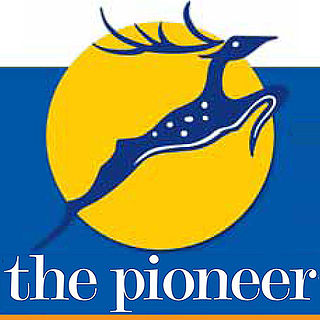Related Research Articles

The Observer is a British newspaper published on Sundays. In the same place on the political spectrum as its sister papers The Guardian and The Guardian Weekly, whose parent company Guardian Media Group Limited acquired it in 1993, it takes a social liberal or social democratic line on most issues. First published in 1791, it is the world's oldest Sunday newspaper.

The Daily Record is a national tabloid newspaper and news website based in Glasgow, Scotland.
The News Letter is one of Northern Ireland's main daily newspapers, published from Monday to Saturday. It is the world's oldest English-language general daily newspaper still in publication, having first been printed in 1737.

The New Zealand Herald is a daily newspaper published in Auckland, New Zealand, owned by New Zealand Media and Entertainment, and considered a newspaper of record for New Zealand. It has the largest newspaper circulation of all newspapers in New Zealand, peaking at over 200,000 copies in 2006, although circulation of the daily Herald had declined to 115,213 copies on average by December 2017. Its main circulation area is the Auckland region. It is also delivered to much of the upper North Island including Northland, Waikato and King Country.
There are several different types of mass media in the United Kingdom: television, radio, newspapers, magazines and websites. The United Kingdom is known for its large music industry, along with its new and upcoming artists. The country also has a large broadcasting and film industry.

The Graphic was a British weekly illustrated newspaper, first published on 4 December 1869 by William Luson Thomas's company Illustrated Newspapers Ltd. Thomas's brother Lewis Samuel Thomas was a co-founder. The premature death of the latter in 1872 "as one of the founders of this newspaper, [and who] took an active interest in its management" left a marked gap in the early history of the publication. It was set up as a rival to the popular Illustrated London News.
The Derby Telegraph, formerly the Derby Evening Telegraph, is a daily tabloid newspaper distributed in the Derby area of England. Stories produced by the Derby Telegraph team are published online under the Derbyshire Live brand.

The Pioneer is an English language daily newspaper in India. It is published from multiple locations in India, including Delhi. It is the second oldest English language newspaper in India still in circulation after The Times of India. In 2010, The Pioneer launched its Hindi version in Lucknow.
The News on Sunday was a left-wing British tabloid newspaper. It was launched in April 1987. Publication ceased seven months later, in November 1987.

The Register, originally the South Australian Gazette and Colonial Register, and later South Australian Register, was South Australia's first newspaper. It was first published in London in June 1836, moved to Adelaide in 1837, and folded into The Advertiser almost a century later in February 1931.

The Sphere: An Illustrated Newspaper for the Home and, later, The Sphere: The Empire's Illustrated Weekly, was a British newspaper, published by London Illustrated Newspapers weekly from 27 January 1900 until the closure of the paper on 27 June 1964.
The Daily News, historically a successor of The Inquirer and The Inquirer and Commercial News, was an afternoon daily English language newspaper published in Perth, Western Australia, from 1882 to 1990, though its origin is traceable from 1840.

The Guardian is a British daily newspaper. It was founded in 1821 as The Manchester Guardian, and changed its name in 1959. Along with its sister papers The Observer and The Guardian Weekly, The Guardian is part of the Guardian Media Group, owned by the Scott Trust. The trust was created in 1936 to "secure the financial and editorial independence of The Guardian in perpetuity and to safeguard the journalistic freedom and liberal values of The Guardian free from commercial or political interference". The trust was converted into a limited company in 2008, with a constitution written so as to maintain for The Guardian the same protections as were built into the structure of the Scott Trust by its creators. Profits are reinvested in journalism rather than distributed to owners or shareholders. It is considered a newspaper of record in the UK.
The Leeds Mercury was a newspaper published in Leeds, West Yorkshire, England. It was published from 1718 to 1755 and again from 1767. Initially it consisted of 12 pages and cost three halfpennies. In 1794 it had a circulation of about 3,000 copies, and in 1797 the cost rose to sixpence because of increased stamp duty. It appeared weekly until 1855, then three times a week until 1861 when stamp duty was abolished and it became a daily paper costing one penny.
The Caledonian Mercury was a Scottish newspaper, published three times a week between 1720 and 1867. In 2010 an online publication launched using the name.

The Sun was an Australian afternoon tabloid newspaper, first published under that name in 1910.
The British Newspaper Archive web site provides access to searchable digitized archives of British and Irish newspapers. It was launched in November 2011.
The Manchester Times was a weekly newspaper published in Manchester, England, from 1828 to 1922. It was known for its free trade radicalism.
The Northern Whig was a daily regional newspaper in Ireland which was first published in 1824 in Belfast when it was founded by Francis Dalzell Finlay. It was published twice weekly, Monday and Thursday, until 1849 when it increased publication to three days a week, Tuesday, Thursday, and Saturday. F.D. Finlay died in 1857 leaving the paper to his younger son also called Francis Dalzell Finlay. In 1858, The Northern Whig became a daily paper. In 1874 the paper became a limited company and it was sold to John Arnott who owned the Irish Times for £17,500, he disposed of it following an attack on Catholics. Samuel Cunningham became Chairman of the paper, and the family owned throughout the 20th century until its demise in 1963, after the second world war James Glencairn Cunningham became the owner and managing editor of the paper.

Taxes on knowledge was a slogan defining an extended British campaign against duties and taxes on newspapers, their advertising content, and the paper they were printed on. The paper tax was early identified as an issue: "A tax upon Paper, is a tax upon Knowledge" is a saying attributed to Alexander Adam (1741–1809), a Scottish headmaster.
References
- ↑ Newspapers: a guide to the shelfmarks of the Major UK national newspapers British Library, September 2007. Retrieved 8 March 2014. Archived here.